When Your AC System Fails: Recognizing True Emergencies
When you need emergency AC repair, time is critical. Your AC system can fail without warning, especially during extreme heat when you need it most. Nearly 90 percent of U.S. households rely on air conditioning, and a sudden breakdown can create dangerous conditions for your family.
Signs you need emergency AC repair immediately:
- Complete system failure during extreme heat (over 90°F)
- Strange burning or electrical smells from the unit
- Loud grinding, screeching, or hissing noises
- Water leaking around the indoor or outdoor unit
- Ice buildup on the evaporator coils
- No airflow or only warm air coming from vents
- Electrical problems like tripped breakers or flickering lights
Pennsylvania summers can be hot and humid, and the last thing you want is for your air conditioner to stop working during a heatwave. AC malfunctions can lead to property damage if left unchecked, and certain situations - like electrical issues or complete cooling failure with vulnerable family members present - require immediate professional attention.
The key is knowing when you're dealing with a true emergency versus a problem that can wait until regular business hours. Understanding these warning signs can help you take the right action quickly and potentially save you from more expensive repairs down the road.
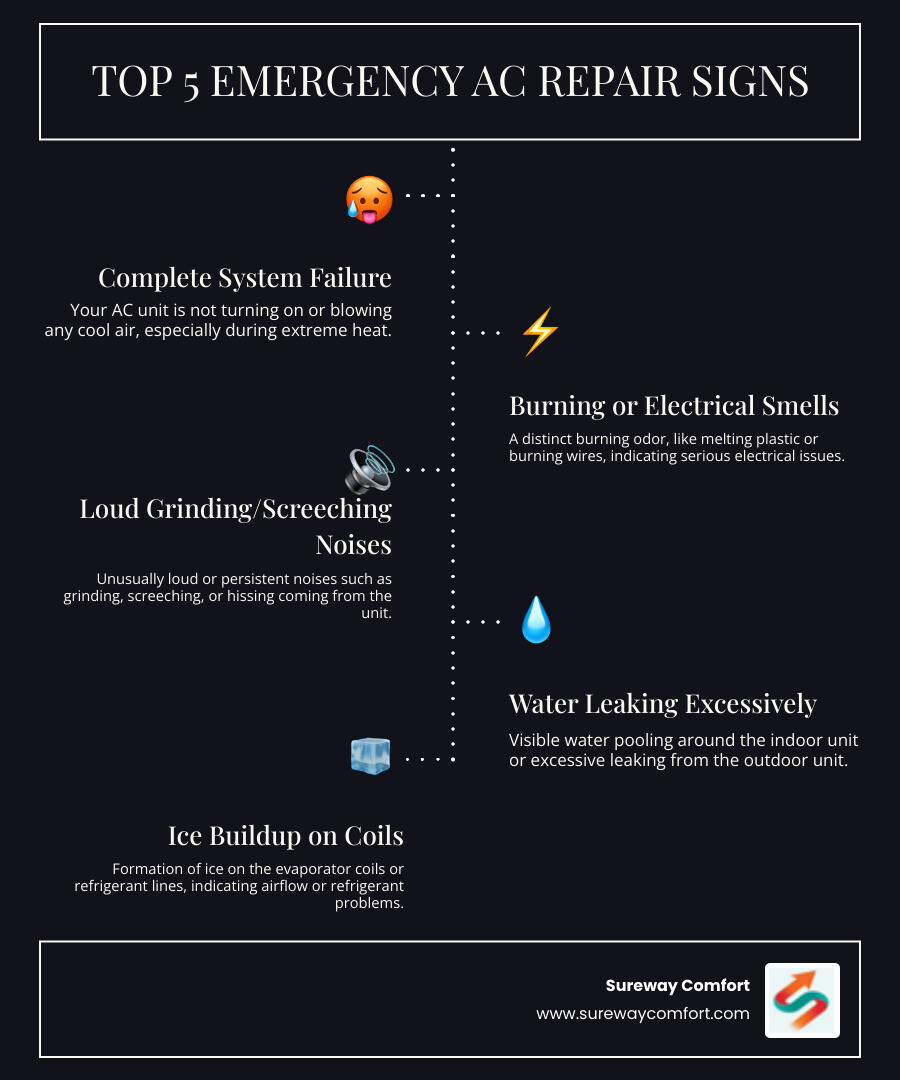
Quick emergency AC repair terms:
Is It a Real Emergency? Key Signs Your AC Needs Immediate Help
When your AC suddenly stops working on the hottest day of summer, panic mode kicks in fast. But before you hit the emergency AC repair button, take a deep breath. Not every AC hiccup requires an urgent service call – though some definitely do.
The trick is knowing the difference between "this can wait until Monday" and "I need help NOW." Understanding these warning signs will help you make the right call and potentially save your family from dangerous conditions.

What to Look and Listen For
Your AC unit is actually pretty chatty when something's wrong – it just speaks in sounds, smells, and visual clues instead of words. Learning this "AC language" can help you spot trouble early.
Strange noises are often your first warning sign. If your unit suddenly sounds like it's grinding coffee beans or screeching like a banshee, that's your cue to call for help. These harsh mechanical sounds usually mean critical parts like the compressor or fan motor are failing. A hissing sound might indicate a refrigerant leak, while buzzing from your electrical panel could signal dangerous wiring issues.
Burning or electrical smells should never be ignored. This often means components are overheating or electrical connections are failing – both serious fire hazards. On the flip side, musty odors point to mold growth inside your system, which can spread throughout your home and trigger health problems.
Visible ice buildup on your evaporator coils or refrigerant lines is another red flag. While it might seem counterintuitive (ice should make things colder, right?), it actually prevents your system from cooling properly and can damage expensive components like the compressor.
Water pooling around your indoor or outdoor unit signals drainage problems or system leaks. Left unchecked, this moisture creates perfect conditions for mold growth and can cause serious property damage.
The most obvious emergency sign? No airflow or warm air coming from your vents when the system should be cooling. This could mean anything from a failed blower motor to complete system breakdown.
For more detailed guidance on these warning signs, check out our comprehensive guide on Signs Your AC Needs Immediate Repair. When your malfunctioning AC shows these symptoms, professional help is usually your best bet.
When Health and Safety Are at Risk
Some AC problems go beyond comfort – they become genuine safety emergencies that put your family at risk.
Extreme heat conditions turn a broken AC from inconvenience into danger. When temperatures climb above 90°F and your cooling system fails completely, vulnerable household members face real health risks. Infants, elderly family members, and anyone with chronic health conditions can quickly develop heat exhaustion or heat stroke.
Electrical issues that cause burning smells or sparking should trigger immediate action. These problems can lead to house fires if ignored. Never attempt DIY repairs on electrical components – that's a job for trained professionals.
Water leaks might seem minor, but they can cause thousands of dollars in property damage surprisingly quickly. More importantly, excess moisture creates ideal conditions for mold growth, which can begin within 24 hours and trigger serious respiratory problems.
Potential fire hazards from overheating components or faulty wiring put your entire home at risk. If you smell burning or see sparks, turn off your system immediately and call for emergency AC repair service.
In any of these situations, don't wait to see if things get better on their own. Your family's safety and your home's protection are worth the cost of an emergency service call. When you need reliable help fast, Sureway Comfort's experienced technicians are ready to restore your comfort and peace of mind.
First Steps: What to Do When Your AC Fails
When your AC suddenly gives up on you, it's natural to feel that wave of panic wash over you. But take a deep breath – staying calm and following a few simple steps can often make all the difference. Not only will this help keep you safe, but it'll also give our technicians valuable information to diagnose the problem faster when they arrive.
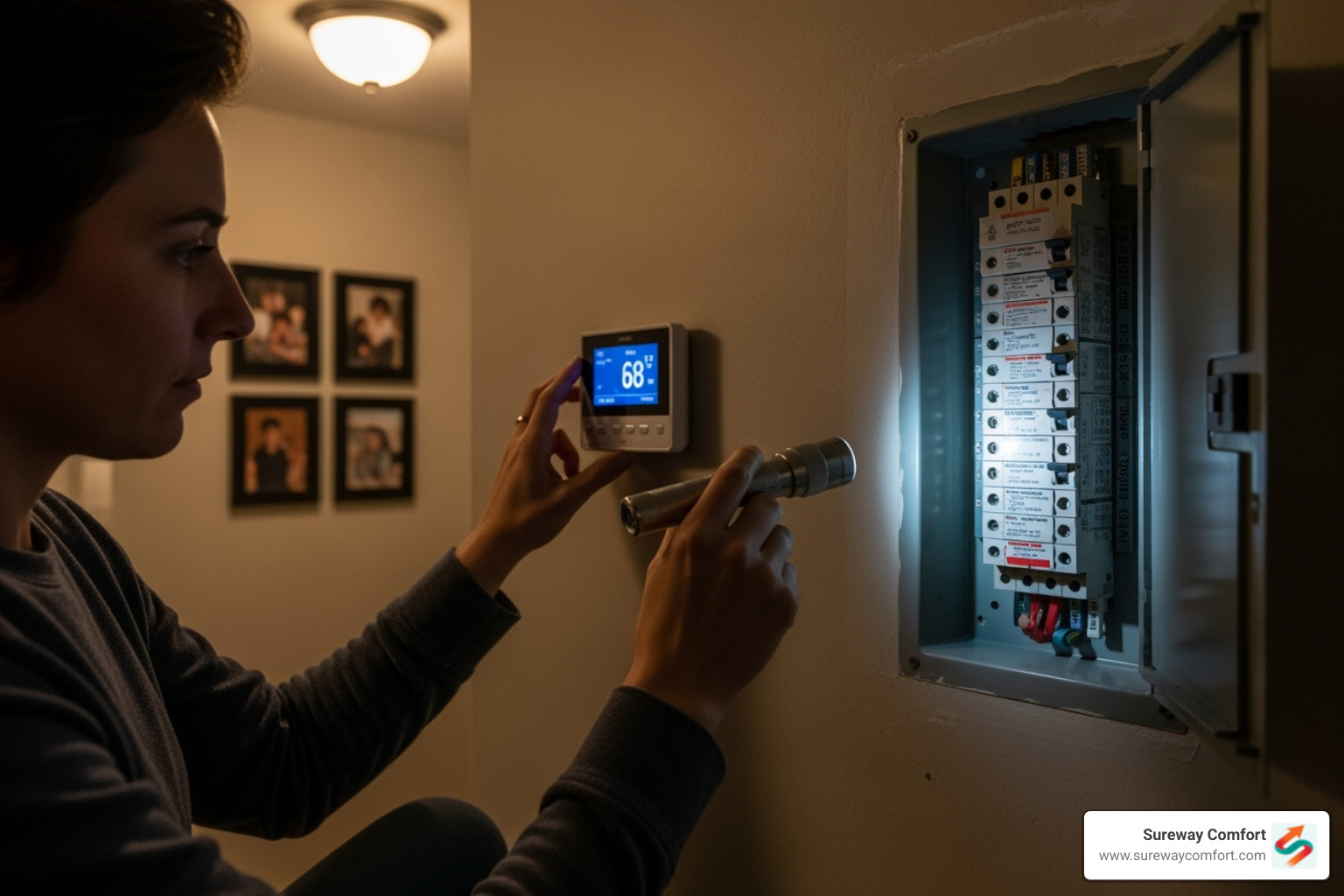
Simple Troubleshooting You Can Do Safely
Before calling for emergency AC repair, there are several safe checks you can perform yourself. Sometimes these simple steps can get your system running again, saving you time and money. Even if they don't fix the problem, they'll help our team understand what's happening with your system.
Start with your thermostat – it might seem too simple, but you'd be surprised how often this is the culprit. Make sure it's set to "Cool" mode and that the temperature is actually lower than your current room temperature. If you have an older thermostat, try replacing the batteries. Smart thermostats can sometimes lose their Wi-Fi connection, so check that your thermostat app is still working properly.
Next, head to your circuit breaker panel. Your AC has its own dedicated breaker, and it might have tripped. Look for a breaker that's flipped to the "off" position or stuck in the middle. If you find one, flip it all the way to "off" first, then firmly back to "on." If it immediately trips again, don't keep trying – this signals a serious electrical issue that needs professional attention right away.
Your air filter deserves a close look too. A clogged filter is one of the most common reasons for AC problems, and it's completely preventable. When your filter gets dirty, it restricts airflow and forces your system to work much harder than it should. This can cause overheating or even complete shutdown. The good news? Dirty air filters can improve air quality and performance by 15% when replaced regularly.
Don't forget about your outdoor unit either. Take a quick walk outside and check that nothing is blocking your condenser. Leaves, grass clippings, or overgrown shrubs can seriously impact your system's ability to release heat. While you're at it, make sure all your indoor vents are open and not blocked by furniture or curtains.
Here's a crucial safety warning: If you notice any burning smells, see smoke, or hear buzzing or popping sounds from your unit or electrical panel, immediately turn off your AC at both the thermostat and the circuit breaker. Don't attempt any further troubleshooting. These are signs of serious electrical problems that could lead to fire hazards, and they need immediate professional attention.
How to Prevent the Need for Emergency AC Repair
The truth is, the best emergency AC repair is the one you never need in the first place. While we're always here when things go wrong, taking care of your system proactively can save you from those stressful moments when your AC decides to quit on the hottest day of the year.
Regular maintenance is your best friend here. Think of it like taking your car in for oil changes – your AC needs that same kind of consistent care. We recommend scheduling annual professional maintenance every spring, before the summer heat really kicks in. During these visits, our technicians clean your coils, check refrigerant levels, inspect electrical connections, and catch small problems before they turn into big, expensive ones.
Changing your air filter regularly is probably the simplest thing you can do to keep your system happy. Check it monthly and replace it every one to three months, depending on how much you use your system and whether you have pets or allergies. It's a small task that makes a huge difference.
Keep that outdoor unit clear of debris year-round. Trim back any plants or shrubs to at least two feet away from the unit, and regularly clear away leaves and grass clippings. Your condenser needs room to breathe.
Pay attention to your system's behavior throughout the year. Unusual sounds, strange smells, or changes in how well it's cooling your home are all early warning signs that something needs attention. Addressing these small issues early can prevent them from becoming major problems later.
Consider joining one of our maintenance plans – they make preventative care easy and affordable. You'll get priority service, discounts on repairs, and regular check-ups that give you real peace of mind. Our team provides comprehensive HVAC Services in Mt. Lebanon and throughout the surrounding areas, helping homeowners avoid those unexpected breakdowns that always seem to happen at the worst possible time.
Taking these preventative steps seriously means you're much less likely to find yourself dealing with an emergency AC repair situation. Your future self will thank you when you're staying cool and comfortable while your neighbors are scrambling to find help.
Your Step-by-Step Guide to Emergency AC Repair
Nobody wants to deal with an AC breakdown, but when it happens, knowing what to expect can make all the difference. At Sureway Comfort, we've streamlined our emergency AC repair process to be as smooth and transparent as possible. From that first panicked phone call to getting your cool air flowing again, we're here to guide you through every step.

Here's exactly what happens when you call us for emergency AC repair: First, we'll gather information about your system and the problem you're experiencing. Then we'll dispatch one of our experienced technicians to your home, usually within hours. Our technician will perform a thorough diagnosis of your system, explaining what they find in plain English - no confusing technical jargon.
Once we've identified the issue, we'll provide you with a clear repair estimate before starting any work. We believe in no surprises when it comes to pricing. After you approve the repair, our technician gets to work fixing your system efficiently and safely. Finally, we'll test everything thoroughly to make sure your AC is running properly and explain any maintenance tips to help prevent future issues.
What to Know About Emergency AC Repair Costs
Let's be honest about the cost factor - emergency AC repair can feel like a punch to the wallet, especially when you're already stressed about your broken AC. Understanding how emergency pricing works can help you prepare and make informed decisions.
After-hours and holiday rates are higher than regular service calls, and there's a good reason for this. When your AC dies at midnight on a Saturday, we have technicians ready to help you. This around-the-clock availability means paying our skilled professionals to be on standby, which naturally increases the cost of emergency services.
Most emergency AC repair calls start with a diagnostic fee. Think of this as the detective work - our technician needs to figure out exactly what's wrong before they can fix it. This fee covers the time and expertise needed to properly diagnose your system's problem.
The repair complexity plays a huge role in your final bill. Sometimes it's something simple like a tripped breaker or a clogged filter that takes minutes to fix. Other times, you might be dealing with a failed compressor or refrigerant leak that requires specialized parts and several hours of skilled labor.
Parts and labor costs vary widely depending on what needs to be replaced. A small capacitor costs much less than a new blower motor or compressor. Our technicians carry common parts on their trucks, which can save you time and additional service call fees.
If you want to get a ballpark idea of potential costs, you can try our free A/C repair cost calculator before calling for service. Addressing an emergency quickly often prevents more expensive damage later - a small refrigerant leak today could become a completely dead compressor tomorrow.
Repair vs. Replace: Making the Right Financial Decision
Sometimes the hardest part of an emergency AC repair isn't fixing the immediate problem - it's deciding whether to keep patching up your old system or invest in a new one. This decision affects your comfort, your monthly energy bills, and your bank account for years to come.
FactorRepair Often Makes Sense If...Replacement Often Makes Sense If...Unit AgeYour AC is less than 10 years oldYour AC is 10-15 years old or olderRepair FrequencyThis is the first major repair neededYour unit needs costly repairs every yearEnergy Efficiency (SEER Rating)Your unit has a decent SEER ratingYour old unit has a low SEER rating and high energy billsCost of Repair vs. New UnitRepair costs less than 30% of replacement costRepair costs more than 50% of replacement costLong-Term SavingsYou expect several more reliable yearsA new efficient unit will significantly lower energy bills
Unit age is often the biggest factor. If your AC is relatively young (under 10 years), a repair usually makes financial sense. But if you're dealing with a 15-year-old system that's breaking down regularly, replacement might be the smarter long-term investment.
Repair frequency tells a story too. One major repair on an otherwise reliable system? Usually worth fixing. But if you're calling for AC Repair in Bridgeville, PA every few months, those costs add up quickly.
Energy efficiency matters more than many homeowners realize. Older units with low SEER ratings can cost hundreds more per year to operate compared to modern, efficient systems. Sometimes the monthly savings from a new unit can offset the replacement cost within a few years.
The cost comparison between repair and replacement isn't always straightforward. A $500 repair on a $3,000 replacement might seem like a no-brainer, but if that same unit needs another $800 repair six months later, you're approaching replacement territory.
Our experienced technicians serving areas like AC Repair in Upper St. Clair, PA will give you honest advice about your system's condition. We'll explain the repair estimate, discuss your unit's expected lifespan, and help you understand the long-term costs of both options.
We want you to make the right decision for your home and budget. Whether that means getting a few more good years from your current system or investing in a new, efficient unit, contact us and we'll help you figure out the best path forward.
Frequently Asked Questions about AC Emergencies
When your AC suddenly decides to take an unscheduled break, it's natural to have a million questions racing through your mind. We've been helping families in Bridgeville, Upper St. Clair, and surrounding areas for years, so we know exactly what you're wondering about. Let's tackle the most common questions we hear during emergency AC repair situations.
What information should I have ready when I call for service?
Getting the right help to your door quickly starts with having the right information ready when you call. Think of it like calling 911 - the more details you can provide, the better we can help you.
Start with your unit details. You'll want to know the make and model of your AC unit, which you can usually find on a sticker attached to your outdoor condenser unit. Don't worry if you can't read it clearly due to weather wear - just let us know what you can see. The approximate age of your system is also helpful, even if it's just "we bought the house five years ago and it was already here."
Describe what's happening in as much detail as possible. Are you hearing strange noises like grinding, screeching, or hissing? Any unusual smells like burning or mustiness? Is there airflow coming from your vents, and if so, is it warm instead of cool? Is the unit cycling on and off rapidly, or has it stopped completely?
Finally, tell us what you were doing when the problem started. Were you just adjusting the thermostat? Did it happen during a thunderstorm? Had it been running fine all day and suddenly stopped? These details help our technicians come prepared with the right tools and parts for your specific situation.
How can I stay cool while waiting for the technician?
Nobody wants to sit in a sweltering house waiting for help to arrive. While our technicians work as quickly as possible to reach you, here are some practical ways to keep your family comfortable during an emergency AC repair wait.
Block out the heat by closing all blinds and curtains, especially on windows that get direct sunlight. Your home will stay significantly cooler if you prevent the sun from turning your living room into a greenhouse.
Get the air moving with ceiling fans and portable fans. Even warm air feels cooler when it's circulating around you - it's the same principle that makes a hot, breezy day more bearable than a hot, still one. Position fans to create cross-ventilation if possible.
Avoid adding more heat to your home by skipping heat-generating activities. Now's not the time to bake cookies or run the dishwasher. Even switching to cold meals and drinks can help keep your internal temperature down.
Head to the coolest spots in your house. Basements are naturally cooler, and bathrooms with tile floors can provide relief. A cool shower or bath can lower your body temperature quickly and help you feel more comfortable.
Stay hydrated - this can't be emphasized enough. Your body needs extra water to regulate temperature when it's working harder to stay cool. Keep water bottles handy for everyone in the family.
Are after-hours AC repairs more expensive?
We'll be straight with you - yes, emergency AC repair services outside regular business hours typically cost more than standard service calls. Weekend, evening, and holiday service calls include additional fees to cover the on-call availability of our skilled technicians.
Think about it this way: when your AC fails at 10 PM on a Saturday night during a heat wave, you need someone who's ready to drop everything and come help your family. That level of availability and immediate response comes with a premium, just like emergency medical services or 24-hour towing.
However, addressing the emergency promptly often saves you money in the long run. A small issue that's ignored can quickly become a major system failure. Water leaks can cause property damage, electrical problems can create fire hazards, and a struggling system can damage expensive components like the compressor.
The peace of mind of having your family comfortable and safe again is often worth the additional cost. Plus, our experienced technicians can often prevent further damage that would result in much more expensive repairs or even a complete system replacement.
If you're facing an AC emergency and need immediate help, contact us for emergency HVAC services - we're here to restore your comfort as quickly as possible.
Get Your Comfort Back, Fast
When your AC breaks down unexpectedly, it feels like everything stops. The house gets stuffy, the kids get cranky, and you're left wondering how quickly you can get back to normal. The good news? Emergency AC repair doesn't have to be a nightmare when you know what to look for and who to call.
Throughout this guide, we've walked you through the warning signs that signal a true emergency - from strange burning smells and grinding noises to complete system failure during a heatwave. We've shown you the simple troubleshooting steps you can take safely, like checking your thermostat settings, replacing those forgotten air filter batteries, and making sure your circuit breaker hasn't tripped.
Most importantly, we've helped you understand when it's time to step back and call the professionals. Some situations - like electrical issues, refrigerant leaks, or complete cooling failure with vulnerable family members in the house - simply aren't DIY projects. Your safety and your family's wellbeing always come first.
At Sureway Comfort, we've been helping families across Bridgeville, South Fayette, Upper St. Clair, Mt. Lebanon, McDonald, Scott Township, Canonsburg, and Bethel Park get through these stressful moments for years. Our experienced technicians understand that when you call for emergency AC repair, you're not just looking for someone to fix a machine - you're looking for peace of mind.
Our streamlined process means no surprises, no runarounds, and no unnecessary delays. From the moment you call to the final handshake, we keep you informed every step of the way. Whether it's a simple fix or a complex repair, our maintenance plans and flexible financing options ensure you have choices that work for your budget.
The best emergency is the one that never happens. Regular maintenance, clean filters, and paying attention to early warning signs can save you from those middle-of-the-night panic calls. But when emergencies do strike - and they will - you'll know exactly what to do and who to trust.




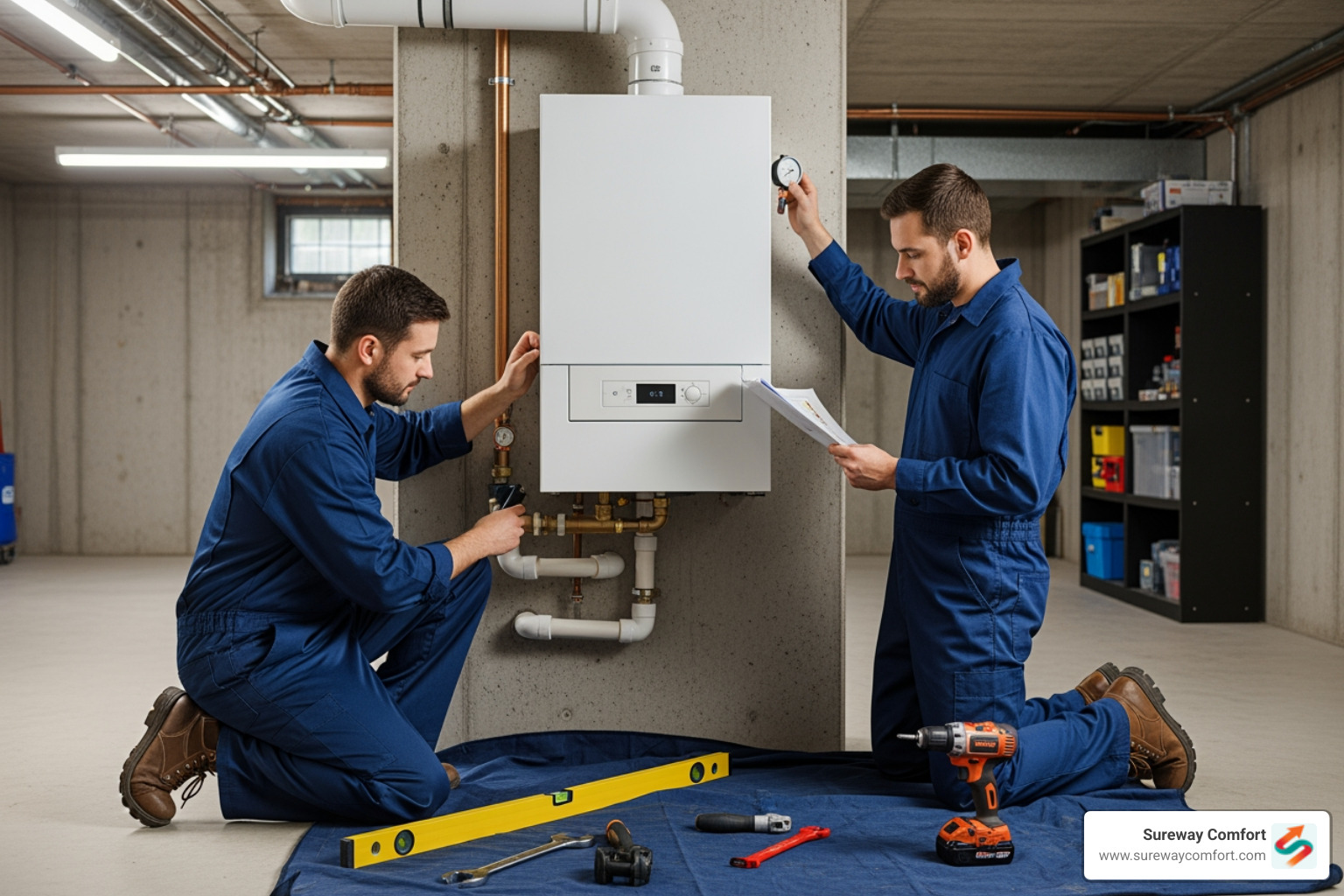

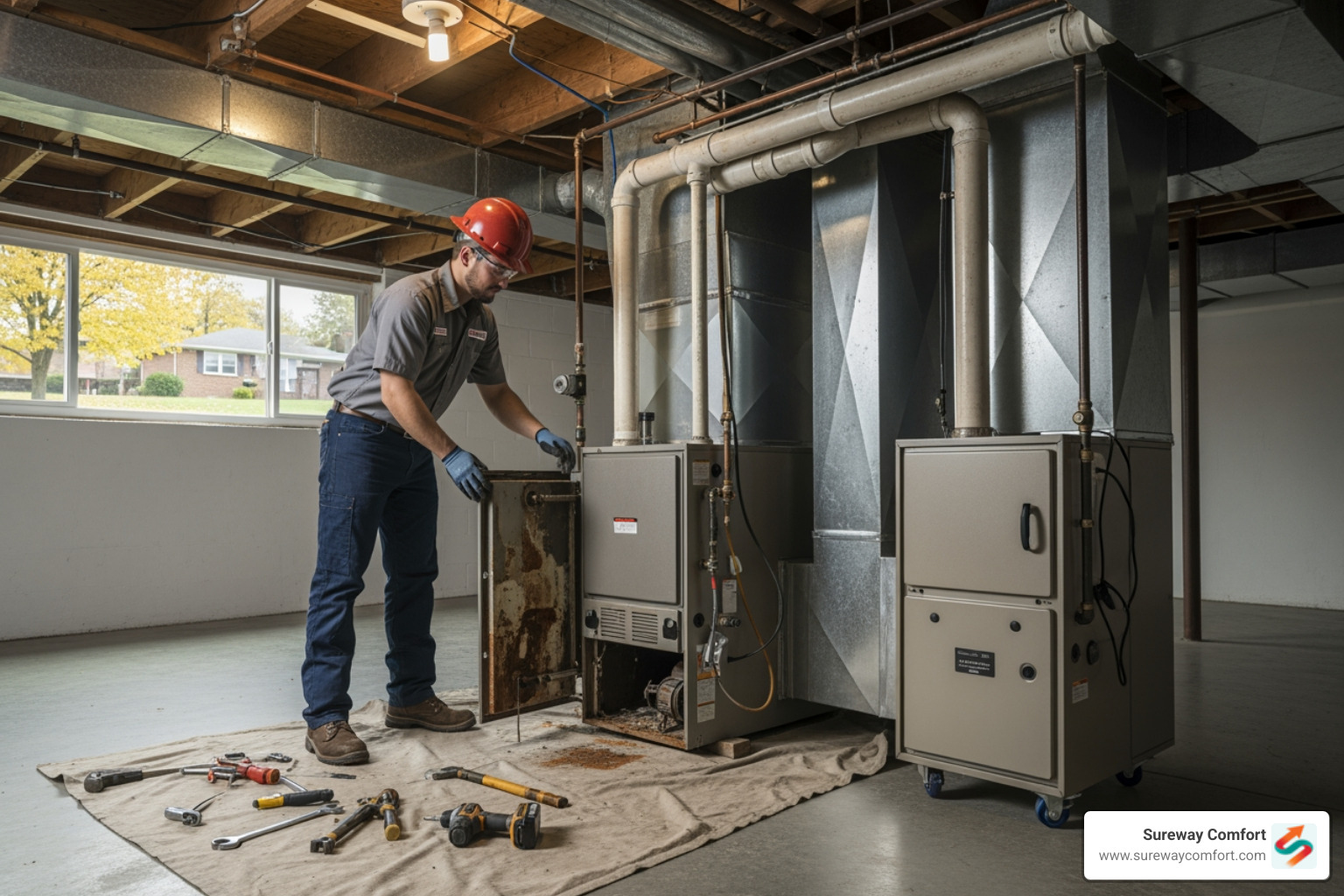
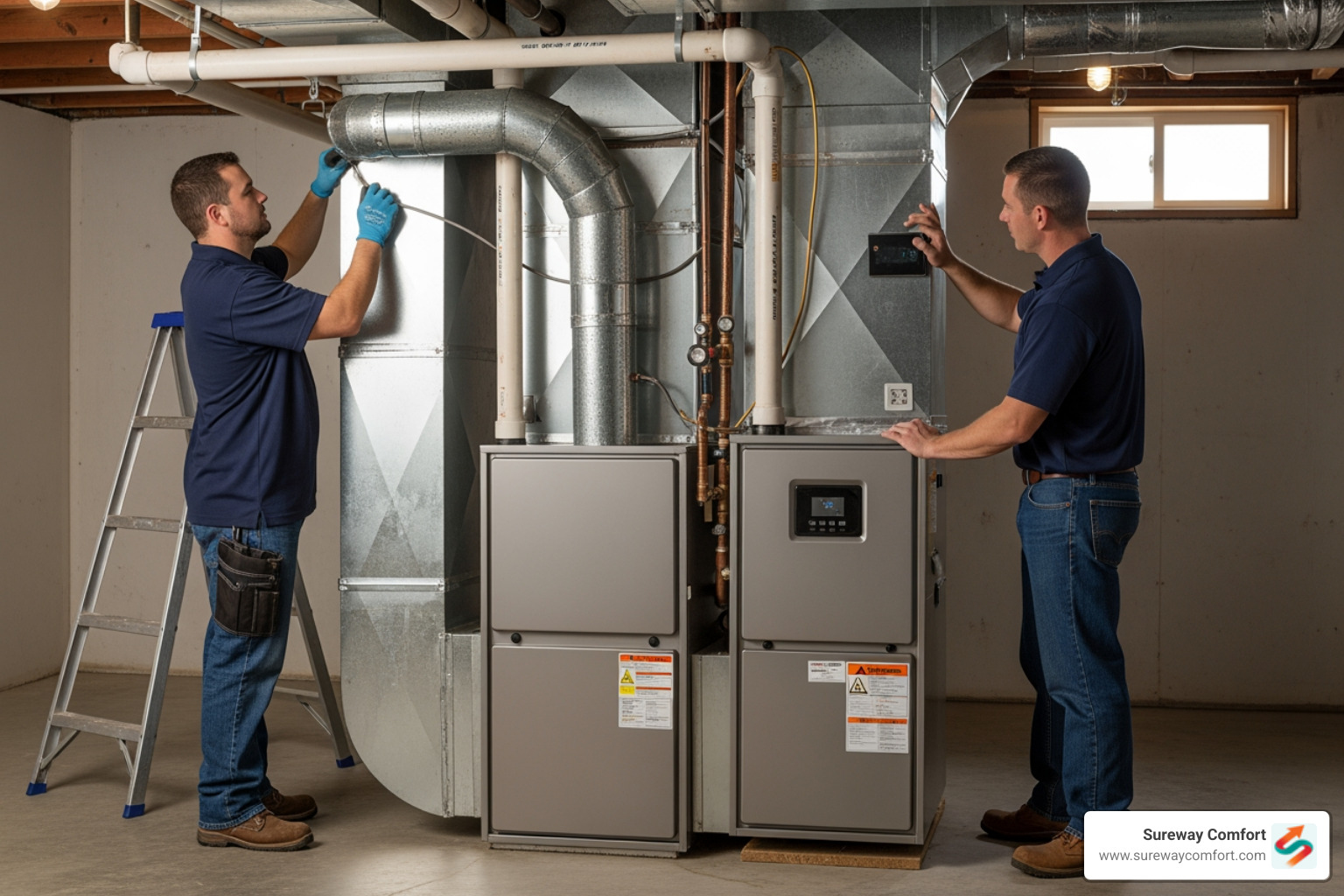




















.avif)



